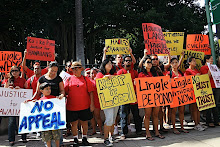The
article below was published in today's Honolulu Advertiser.
Ceded lands focus of rally
Group urges state to drop appeal of earlier ruling barring salesBy Gordon Y.K. Pang - Advertiser Staff Writer
Native Hawaiian supporters led by a group of current and former law school and Hawaiian studies students will hold an 11:30 a.m. rally tomorrow at the state Capitol to demand that Gov. Linda Lingle and Attorney General Mark Bennett drop their appeal to the U.S. Supreme Court of a lower court ruling that bars the state from selling ceded lands until claims of Native Hawaiians are resolved.
Derek Kauanoe, a recent graduate of the University of Hawai'i's Richardson School of Law and a spokesman for the Kupu'aina Coalition, said the rally's main purpose is to draw attention to a state action that, if successful, could diminish Native Hawaiian rights and dismantle programs for Hawaiians.
Bennett said he does not agree with that conclusion, adding that the Lingle administration is in favor of settling Native Hawaiian claims and supports federal recognition of a Native Hawaiian government entity.
ISSUE AT HANDThe case, which pits the state against the state Office of Hawaiian Affairs, is expected to be heard in late February or March, Bennett said.
At issue is what the state can or cannot do with approximately 1.2 million acres of ceded lands, lands formerly held by the Hawaiian government. In January, the Hawai'i Supreme Court ruled that the state cannot sell or otherwise transfer lands ceded to the state until Native Hawaiian claims against those holdings were resolved.
The state argues that the 1959 Admission Act grants it the authority to manage ceded lands, including selling them.
But OHA and the four Native Hawaiians who brought the suit in 1994 say that Congress' 1993 Apology Resolution, as well as subsequent action by the state Legislature, effectively bar the state from selling or transferring those lands to an outside entity until the claims are settled.
Kauanoe said it is critical that the state not be allowed to sell or transfer ceded lands until the claims are resolved, and he points to the reasons listed by the Hawai'i Supreme Court.
"I think that moratorium puts Native Hawaiians on a level playing field to enter into negotiations for a settlement with the state," Kauanoe said. "If the (U.S.) Supreme Court overturns our state Supreme Court's ruling, basically the state would be able to sell lands that Native Hawaiians have an unrelinquished claim to before they even settle it."
Allowing the state to sell those lands, he said, "would be detrimental to any Hawaiian program that receives funding from the revenue of those lands."
SEEKING CLARIFICATIONBennett, in response to Kauanoe's comments, said, "The issue before the United States Supreme Court is not the constitutionality or legality of any programs that benefit Native Hawaiians." Instead, he said, the High Court could clarify any gray area left by the Apology Resolution.
"The lawsuit that was filed more than a decade ago took the position that the Apology Resolution changed the landscape, clouded the state's title," Bennett said. "What we're trying to do is uphold what we believe to be the correct legal principle ... that the state holds good title to the land ... as was given to the state in the Admission Act."
Bennett added: "We believed, and continue to believe, that the claims that Native Hawaiians have should be addressed through the legislative process — through the Legislature and the Congress — through vehicles like the Akaka bill but not in the courts."
Kauanoe said the Hawai'i Supreme Court, because it is made up of Hawai'i residents, is in a much better position to decide the case than is the U.S. Supreme Court.
Kupu'aina is composed of the 'Ahahui o Hawai'i Law Student Organization, and faculty and students of the Kamakakuokalani Center for Hawaiian Studies.
Reach Gordon Y.K. Pang at gpang@honoluluadvertiser.com.






.jpg)




